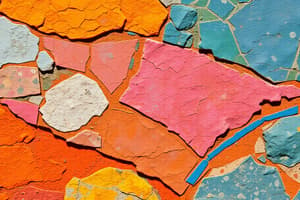Podcast
Questions and Answers
What is the primary process through which sedimentary rocks are formed at the Earth's surface?
What is the primary process through which sedimentary rocks are formed at the Earth's surface?
Deposition followed by lithification.
Define lithification in the context of sedimentary rock formation.
Define lithification in the context of sedimentary rock formation.
Lithification is the process that transforms loose sediments into solid rock through compaction and cementation.
Explain the role of mechanical agents in the formation of clastic rocks.
Explain the role of mechanical agents in the formation of clastic rocks.
Mechanical agents like water, wind, ice, and gravity transport sediment fragments, which accumulate to form clastic rocks.
What is detritus in the context of sediment accumulation?
What is detritus in the context of sediment accumulation?
What is diagenesis and how does it relate to sedimentary rock formation?
What is diagenesis and how does it relate to sedimentary rock formation?
Describe the process by which chemical sedimentary rocks are formed.
Describe the process by which chemical sedimentary rocks are formed.
How do size, shape, and density influence sediment deposition?
How do size, shape, and density influence sediment deposition?
What distinguishes mechanically formed (clastic) rocks from chemically formed rocks?
What distinguishes mechanically formed (clastic) rocks from chemically formed rocks?
Flashcards are hidden until you start studying
Study Notes
Formation and Characteristics of Sedimentary Rocks
- Sedimentary rocks form on Earth's surface via deposition.
- Composed of weathered products, eroded materials, and organic substances.
- Lithification is the process that solidifies unconsolidated sediments into rock.
Deposition Process
- Rocks and particles are transported by wind or water from one location to another.
- Particles are deposited when the transporting medium loses energy.
- The sedimentation process is crucial for the formation of sedimentary rocks.
Lithification Process
- Involves compaction, cementation, and diagenesis, transforming loose sediments into solid rock.
- Occurs over time as sediments are buried under more layers, leading to physical and chemical changes.
- Sedimentary rocks form by the accumulation and lithification of fragments from pre-existing rocks or via precipitation at surface temperature.
Types of Sedimentary Rocks
- Clastic (mechanically formed) rocks: made from accumulation of fragments from preexisting rocks.
- Chemically formed rocks: result of mineral precipitation from dissolved minerals in water.
- Originally formed rocks: consist of sedimentary materials without alteration from weathering.
Clastic Rock Formation Steps
- Decay and disintegration: Uniformly hard rock disintegrates, producing detritus.
- Transport of sediments: Detritus is transported by natural agents like wind, water, and glaciers across various distances.
- Gradual deposition: Sediments settle in layers based on size and density under normal pressure and temperature.
- Diagenesis: Process that transforms sediments into a cohesive solid rock via compaction, consolidation, and cementation.
Chemical Sedimentary Rocks
- Formed by chemical precipitation when minerals dissolved in water are carried away and redeposited.
- Precipitation occurs when water evaporates, leaving minerals behind.
Studying That Suits You
Use AI to generate personalized quizzes and flashcards to suit your learning preferences.




